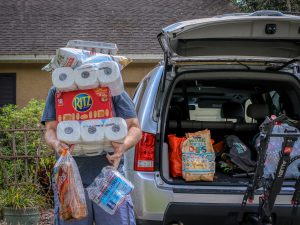For some examples of hoarding and how it can affect your life, consider the following scenarios:
Lisa is a twenty-nine-year-old who has a compulsive urge to hold onto every flyer and piece of paper offered to her. Her apartment counters are overwhelmed with stacks and stacks of flyers, books, newspapers, unopened mail, business cards, and years of Christmas cards and birthday cards. She feels overwhelmed by the influx of daily items and does not know where to begin, so she avoids it altogether.
 Nancy is a sixty-year-old who is a self-proclaimed bargain shopper extraordinaire. She can never say no to a bargain, even if it is not something she will need for a long time or at all. Her garage is filled with extra storage containers she got on sale. Her bedroom floor is covered in bags of clothes with tags still on them that she’s found over time, just knowing that the perfect occasion would arise to wear them.
Nancy is a sixty-year-old who is a self-proclaimed bargain shopper extraordinaire. She can never say no to a bargain, even if it is not something she will need for a long time or at all. Her garage is filled with extra storage containers she got on sale. Her bedroom floor is covered in bags of clothes with tags still on them that she’s found over time, just knowing that the perfect occasion would arise to wear them.
Her kitchen counters are filled with extra cleaning supplies she has found for a spectacular price. Her living room is filled with extra gifts for friends that she might need over time. She always likes to feel prepared, even though her current living situation makes it difficult to know what she has.
Benjamin is an eighty-year-old widow who lost the love of his life almost five years ago. Since he lost her, he hasn’t cleaned out his car. It is filled from the floorboard to covering the seats with fast food trash, old plastic coffee cups, random bags from parties and Christmas get-togethers, sweaty clothes from the gym, and other items that have gotten lost amidst the mess.
Benjamin and his wife used to sit in their very clean car (thanks to his wife’s love of cleaning) and listen to music as their thing. Since she passed, he just leaves everything as is and avoids sitting in the car too long.
When we think of the term “hoarder,” we often think of seeing a filthy home that is stacked from floor to ceiling without end. Some general possessions that are common for hoarders include mail, newspapers, containers of random items, books, clothing, baby items, and even garbage.
Some people collect stamps, coins, or novelty dolls. The difference between collecting and hoarding is that hoarder homes are often in complete disarray whereas collections are usually displayed neatly, and the owners are proud to show them off.
 Hoarding is an overlooked element of obsessive-compulsive disorder. It is the opposite of what people usually think of when they hear OCD because they believe that those who struggle with OCD are strictly germaphobes.
Hoarding is an overlooked element of obsessive-compulsive disorder. It is the opposite of what people usually think of when they hear OCD because they believe that those who struggle with OCD are strictly germaphobes.
While some people with OCD vacuum, mop, and scrub everything fifteen times a day and glove up when opening doors, there are also people who are compulsive when it comes to holding onto their belongings, even if there is not a direct emotional attachment.
According to the American Psychiatric Association, “People with hoarding disorder have persistent difficulty getting rid of or parting with possessions due to a perceived need to save the items. Attempts to part with possessions create considerable distress and lead to decisions to save them. The resulting clutter disrupts the ability to use living spaces.”
Hoarding can lead to inhumane living conditions, health and safety hazards, and unaddressed emotional trauma that affects one’s future. Seeking help through Christian Counseling Pasadena can provide support in addressing the root causes of hoarding, offering a compassionate, faith-based approach to healing and creating healthier living environments. If you struggle with hoarding or any form of OCD or know someone who does, here are a few things to consider:
Obsessive-Compulsive Disorder is not a little quirk
For those who struggle with any element of OCD, it does not have an easy on and off switch. You cannot tell a germaphobe to get over it. You cannot simply tell a hoarder to clean everything out and move on with their life. Hoarders often deal with unwanted and intrusive thoughts about acquiring and keeping possessions.
They struggle with the thought of clearing out and getting rid of things. It can be compared to a baby and their pacifier or a toddler and their favorite blanket. It soothes them, and they deem it necessary to keep moving forward.
Hoarding takes more than a professional organizer
Hoarders often have an underlying problem and need professional counseling to help aid them in their journey. Spending the time and energy to have a home professionally cleaned would be great for a time, but counselors want to help ensure that the underlying issue is addressed. If a home is reorganized without the hoarder’s consent, it often results in emotional distress, and they may feel an even stronger pull to cling to their possessions.
Compulsive hoarding may be linked to trauma

OCD tendencies, past hardship, or poverty. When a person has dealt with the loss of a spouse, the loss of a home, or another major life event, it can ignite an emotional fire and lead to worsening hoarding habits.
OCD thoughts can also lead to hoarding items, such as feeling like everything they have touched in a store is now contaminated, so they must purchase it. Hoarders might also feel like discarding something could lead to harm or contamination for someone else (old glasses or trash, for example).
Here are a few examples of the thoughts that hoarders replay over and over:
- “Everything I have touched is now contaminated, so I have to buy everything my hand has grazed.”
- “If I throw these old glasses away, someone might get hurt if the glass breaks.”
- “If I throw this old receipt away, I will not have proof I was there if something unexpected arises. I better hold onto it just in case.”
- “I do not need this book or magazine anymore, but what if my future grandchild wants or needs this book one day?”
- “Twelve is my lucky number, so if I do not buy twelve of everything, something horrible might happen to me.”
- “I need to return this bag of clothes because they do not fit me, but the clothes are now contaminated, so I have to hold onto them because I do not want to be the reason someone else is contaminated.”
If you are struggling or have a friend or family member struggling with hoarding tendencies, here are a few things to consider as you navigate these thoughts:
 Try to be sympathetic. While it can be easy to become angry and assume they are deciding to live in overwhelming filth, it goes beyond being lazy. They are dealing with intrusive thoughts and compulsions that deal with attachment to the items they are holding onto. Remember that the items mean something to them.
Try to be sympathetic. While it can be easy to become angry and assume they are deciding to live in overwhelming filth, it goes beyond being lazy. They are dealing with intrusive thoughts and compulsions that deal with attachment to the items they are holding onto. Remember that the items mean something to them.
Encourage them to start small. If their home is unsafe, suggest a plan to help make things safer, to begin with, such as ensuring they have a fire exit and that their hallways and doorways are clear. Start with something easy so it begins without the overwhelming anxiety of an overhaul, right off the bat.
Offer to help. When hoarding runs haywire, it can feel overwhelming to think about beginning to clean and organize piles of stuff. As you begin cleaning things out, ask about their attachment to the items and try to see beyond more than just stuff. Try to look at the heart and see beyond just things.
Offer encouragement about what organizing can mean for them. Too often, hoarders do not have company or social gatherings in their homes because of the excess stuff. Encourage them that in the process of decluttering, they can finally feel confident to host a birthday party or family get-together.
Motivation cannot be pushed, emotional baggage cannot be instantly discarded, and compulsive thoughts cannot just be stopped. Those struggling with emotional or physical hoarding and OCD tendencies must pursue Christian Counseling. True fulfillment and joy do not come from piles of things or holding onto emotional trauma.
Lasting joy comes from the peace of the Holy Spirit, addressing past trauma, establishing a strong support system, and establishing a plan to move forward – emotionally, physically, and spiritually.
When we are too encapsulated with and driven by material things, it makes it difficult to surrender our hearts and lives to Jesus.
The counselors at Christian Counseling Pasadena offer a non-judgmental approach for those dealing with OCD tendencies, compulsions that one feels too embarrassed to admit, and hoarding habits. Whether you are hoarding physical items or emotional hurts, you can schedule an appointment and choose the journey of hope and healing that is waiting for you.
“Stocking Up”, Courtesy of Mick Haupt, Unsplash.com, CC0 License; “Empty Shelves”, Courtesy of John Cameron, Unsplash.com, CC0 License; “Cleaning Supplies”, Courtesy of Kelly Sikkema, Unsplash.com, CC0 License; “Books”, Courtesy of Eli Francis, Unsplash.com, CC0 License
-
Kate Motaung: Curator
Kate Motaung is the Senior Writer, Editor, and Content Manager for a multi-state company. She is the author of several books including Letters to Grief, 101 Prayers for Comfort in Difficult Times, and A Place to Land: A Story of Longing and Belonging...
DISCLAIMER: THIS ARTICLE DOES NOT PROVIDE MEDICAL ADVICE
Articles are intended for informational purposes only and do not constitute medical advice; the content is not intended to be a substitute for professional medical advice, diagnosis, or treatment. All opinions expressed by authors and quoted sources are their own and do not necessarily reflect the opinions of the editors, publishers or editorial boards of Stone Oak Christian Counseling. This website does not recommend or endorse any specific tests, physicians, products, procedures, opinions, or other information that may be mentioned on the Site. Reliance on any information provided by this website is solely at your own risk.





